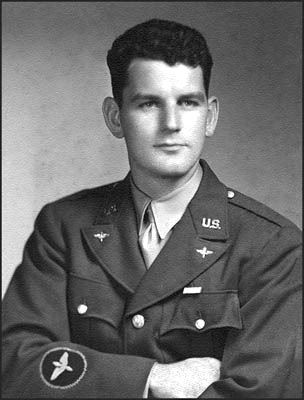|
My Holmes story begins with my
great-great-great-grandfather, John Holmes, who immigrated to America from
Colraine, Ireland, in 1757. John became the father of William Holmes, who
married and had six children. William served in the United States Army
from 1812 to 1815, in the War of 1812. One of his children was William
Holmes II, my great-grandfather, who had three wives and twenty children.
One child was named John Carson Holmes, who served in the Civil War. His
brother, Wilson Davis Holmes, is my grandfather, and his son, Wallace Burr
Holmes, is my Dad.
My parents were Rose and Wallace Burr Holmes,
and life began for me on February 17, 1918, in Jonesboro, Indiana. When I
was around two years of age, my parents divorced, and when Dad was
discharged from the Army in 1919, he "won me" in the "divorce
proceedings." My dad served in the Army from April of 1917 to May of 1919.
Dad was a professional French Horn player before he volunteered for
military service. During his military service he was in the Army
bandmaster's school at Governor's Island, N.Y., and worked in
intelligence.
Later on he married Irene Hiley of Clay City, Kentucky. Dad was traveling with the Roy D. Smith Scots Highlanders Band, and was often accompanied by Mom Irene and me. When I was
five, Dad became a fixture in the Atlanta theaters and symphony, and was
President of the Musicians Union there. During the deep depression years,
he traveled with John Phillip Sousa, Arthur Pryor, and the Ringling
Brothers Circus, from 1928 to 1933. We didn't travel with him because I
was in school in Atlanta, Georgia, and later in Indiana. His seasons were
seven months long, only at home for five months of the
year.
Even though I was very young, I can still remember certain
things that happened when I was around four or five years of age. At the
age of five, in 1923, I can still recall my Dad going into the attic in
Atlanta with lots of excitement. He had bought a crystal set radio with
earphones, the class of the day, I think. This was the advent of the
radio. Somehow he had put the radio together and was nervous and joyous as
a kid while listening to something hardly better than static---and, he had
the professional's ear for music!
In the same attic, and in the same home in Atlanta, somewhere around 1923, he was hammering a piece of wood and hit his thumb. He said nothing. I asked why he didn’t say something. He wanted to know what he should say. Later on he told me that I let him know that he should have said, "Damn it!" I must have heard that somewhere; maybe from a first grader. As they used to say back then, "Little pitchers have big ears."
As I have said, my sister was seven years
older than I. In 1928, I was ten and she was seventeen, and going out with
a college halfback in Atlanta. He came from a family with money, and would
come to pick up sis in his brand new Ford roaster. He was a student at
Georgia Tech. Once, when Sis was still in her room dolling up, and he was
waiting for her in the car, I was looking over the new job. He pushed
something in on the dashboard, pulled it out, and told me to put my thumb
on it. The damn thing was a cigarette lighter, which was a new feature in
automobiles. As a result of this adventure, I carried a burnt ring on my
thumb for quite some time. This taught me not to be too curious when boys
came to pick up Sis. It was much more profitable to ask them for a dime,
and then get out of the picture.
Back to
Top
|

